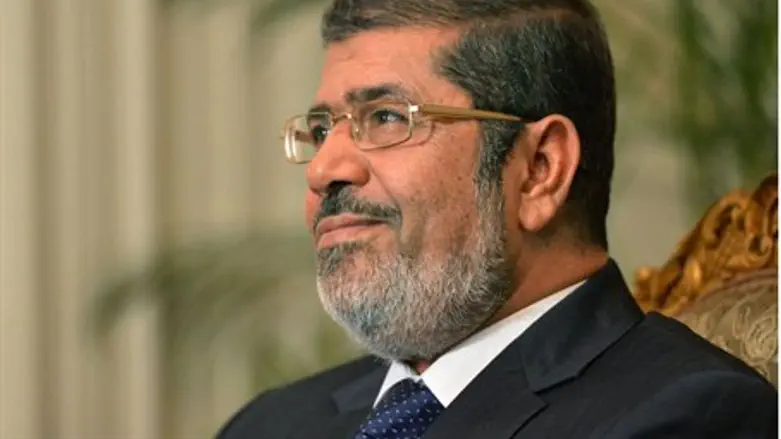
Critics of Egyptian President Mohammed Morsi branded him a “new pharaoh” on Thursday, after he assumed sweeping powers, AFP reported.
The move is a blow to the pro-democracy movement that toppled former president Hosni Mubarak, himself derided by many as a pharaoh, and raises concerns that Islamists will be further ensconced in power, the report noted.
"The president can issue any decision or measure to protect the revolution," according to a decree read out on television by presidential spokesman Yasser Ali.
"The constitutional declarations, decisions and laws issued by the president are final and not subject to appeal," he added.
Former UN atomic energy agency chief Mohamed ElBaradei lashed out at the declaration, which would effectively put the president above judicial oversight.
"Morsi today usurped all state powers and appointed himself Egypt's new pharaoh. A major blow to the revolution that could have dire consequences," ElBaradei wrote on his Twitter account.
As part of his decree, Morsi also sacked prosecutor general Abdel Meguid Mahmud, whom he failed to oust last month amid strong misgivings among the president's supporters about the failure to secure convictions of more members of the old regime.
He appointed Talaat Ibrahim Abdallah to replace Mahmud and, within minutes of the announcement, the new prosecutor was shown on television being sworn in.
In his pronouncement, the president also ordered "new investigations and retrials" in the cases dealing with the deaths of protesters, a decision that could see Mubarak reinvestigated.
Mubarak and his interior minister Habib al-Adly were both jailed for life for their role in ordering the killings. Six top security chiefs who stood trial with them were acquitted.
Morsi also said no judicial body can dissolve the upper house of parliament or the Islamist-dominated constituent assembly that is writing a new constitution and which has been criticized by the secular-minded opposition for failing to represent all segments of society.
The declaration is aimed at "cleansing state institutions" and "destroying the infrastructure of the old regime," the president's spokesman said, according to AFP.
Ali said Morsi had issued a new law, which is yet to be ratified by the new parliament, calling for the creation of a "revolutionary prosecution" to investigate crimes related to the killing of protesters and to hold accountable anyone who withheld evidence in previous trials.
A senior official with the Justice and Freedom Party, the Muslim Brotherhood's political arm to which Morsi belongs, said the move was necessary to guarantee the revolution was on course.
"We could not find any legal avenue to pinpoint and prosecute those in the ministry of interior who were responsible for killings," Gehad Haddad told AFP.
He said there had been a string of acquittals of interior ministry officials, evidence was withheld in cases, investigations had been weak and many had not been brought to trial over the killings of hundreds of protesters during and since the uprising.
"The avenues we are taking are born of necessity, not choice," he said.
There were vocal denunciations of Morsi's declaration on Thursday, reported AFP.
"We didn't have an uprising so that we put in place another dictator," said a furious Khaled Ali. "He's not just a pharaoh, he thinks he's God."

